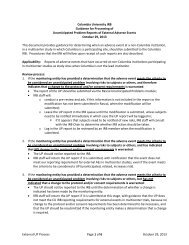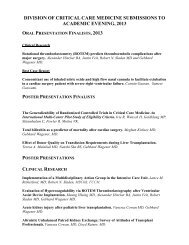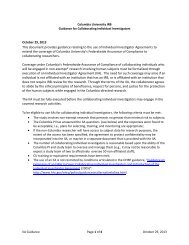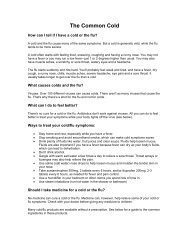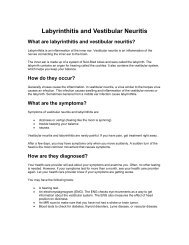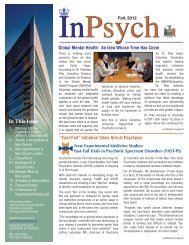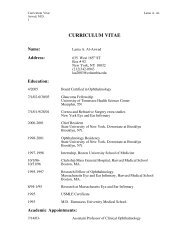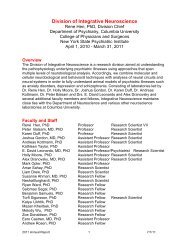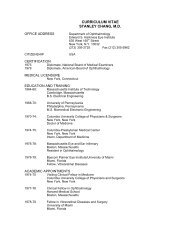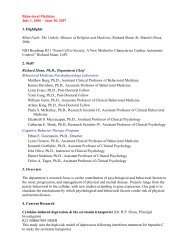news PS - Columbia University Medical Center
news PS - Columbia University Medical Center
news PS - Columbia University Medical Center
You also want an ePaper? Increase the reach of your titles
YUMPU automatically turns print PDFs into web optimized ePapers that Google loves.
“It used to be thought you ate, the gastrointestinal tract digested food<br />
and absorbed the calories,” says Dr. Leibel. “Now, we know there are<br />
important interactions of the gut with food and the gut plays a role in<br />
influencing behavior to start and stop eating and for food preference. It<br />
is not just a pipe.”<br />
Gut hormones, such as the incretins GLP-1 and GIP, regulate insulin<br />
secretion, while others, such as PYY-1 and CCK, affect food intake. In<br />
fact, several new diabetes drugs, such as exenatide (Byetta) and liraglutide<br />
(Victoza), work as a GLP-1 receptor agonist to stimulate insulin release.<br />
Nerve signals from the gut can also stimulate the vagus nerve, a cranial<br />
nerve that extends from the brain stem to the viscera, with or without<br />
hormonal input.<br />
“It is not surprising that manipulating the gut via surgery can affect<br />
glucose and insulin metabolism, leading to a reversal of symptoms and a<br />
decrease in the number of drugs needed to treat diabetes,” says Dr. Leibel.<br />
But the jury is still out as to whether calorie restriction or hormonal<br />
changes (or both) account for the improvements. “Patients are not in a<br />
neutral energy state before surgery. They eat less calories; negative energy<br />
balance can affect glucose metabolism.”<br />
Doctors cannot force morbidly obese patients to lose, then maintain,<br />
the weight loss they need to effect metabolic changes. “It is hard for<br />
patients to reduce calories to lose weight and improve their metabolism<br />
but even harder to keep the weight off,” says endocrinologist Blandine<br />
Laferrère, M.D., associate professor of medicine and co-director of the<br />
hormonal core laboratory at the New York Obesity Nutrition Research<br />
<strong>Center</strong>, an NIH-funded collaboration of <strong>Columbia</strong> and St. Luke’s-Roos-<br />
evelt Hospital <strong>Center</strong>. Dr. Laferrère has researched the hormonal effects<br />
of bariatric surgery for the past 10 years.<br />
Dr. Leibel acknowledges the surgery is vital for morbidly obese patients<br />
and thinks gut hormones may be playing a role in addition to weight<br />
loss. He also believes that research about the altered gut hormones’<br />
mechanisms of action after the surgery may lead to new drugs and less<br />
invasive interventions.<br />
Evidence for and against the metabolic argument<br />
What evidence favors either calorie restriction/weight loss or hormonal<br />
changes?<br />
Whether weight loss and calorie restriction play a more dominant role than<br />
hormonal changes after bariatric surgery is unclear. Gastric bypass seems to<br />
be working by both mechanisms. However, bypassing the duodenum may<br />
not be necessary. Animals with diabetes that have had sleeve gastrectomy<br />
lose weight, have an improvement in diabetes, and have an incretin-like<br />
response similar to what occurs in gastric bypass, points out Dr. Laferrère.<br />
But Melissa Bagloo, M.D., assistant professor of clinical surgery in<br />
the <strong>Center</strong> for Metabolic and Weight Loss Surgery, thinks hormones are<br />
more at play. In a study in which type 2 diabetic rats underwent a duodenal-jejunal<br />
bypass, a gastrojejunal bypass, or a sham operation, the<br />
animals were fed the same type of diet. The animals that underwent the<br />
duodenal-jejunal bypass, which, similar to the Roux-en-Y, excludes the<br />
initial portion of the small intestine but does not alter the stomach, maintained<br />
significantly better glucose control, suggesting that the surgery’s<br />
hormonal effects – not fewer calories – were responsible, says Dr. Bagloo.<br />
Spring 2012 <strong>Columbia</strong>Medicine 27



